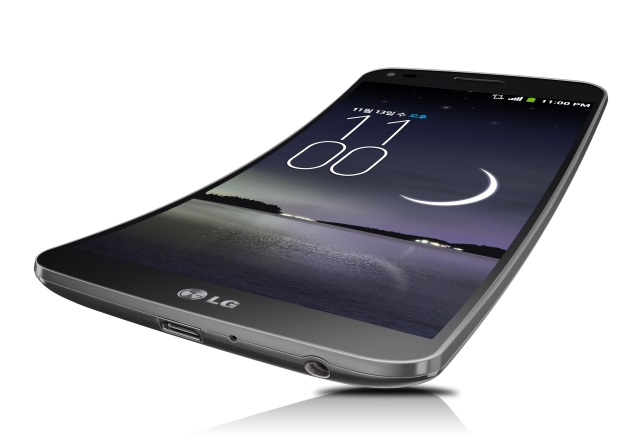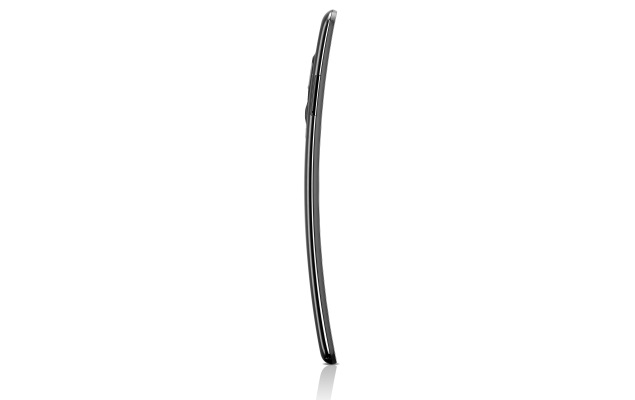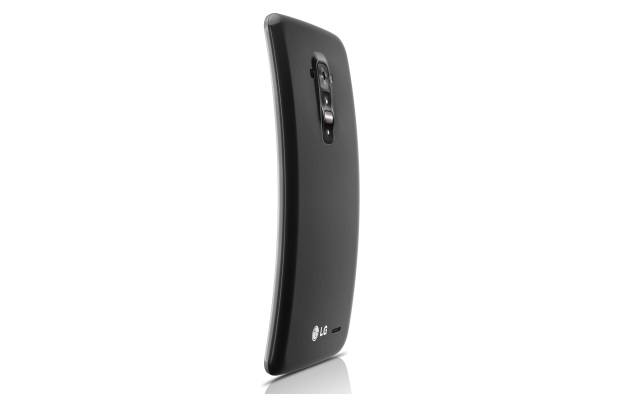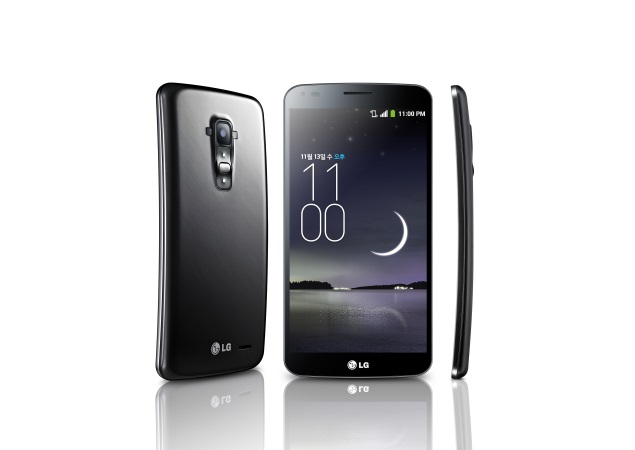LG finally introduced its first curved display smartphone in India, the G Flex, at an event in New Delhi. Indian consumers will have to wait till next year to get their hands on the device, as the G Flex will be available in India only in February 2014.
We got a chance to play with the LG G Flex at the event however, and sum up our first impressions below.
When we first held the G Flex in our hands, we were definitely a bit taken aback by its ergonomic curved design, which definitely is the device's USP. The G Flex is curved on its horizontal axis which gives the device's top and bottom edges a curl shape.
The biggest perceived advantage of the G Flex's curve in our limited period usage, is while talking on the device - the design definitely better hugs your face, much like an old landline phone. In terms of gripping, the curve also helps to comfortably hold the device, but the rear is made of plastic, so it can also slip out during long usage.
When compared to some of its close competitors like HTC One Max and the Galaxy Mega 6.3, the G Flex (160.5x81.6x8.7mm) is better to hold and move around thanks to the curve design.
Next big thing which is very much noticeable in the G Flex is its size, the 6-inch display does puts it in the phablet category and does looks like a large device in hands. Notably, we were unable to easily use the G Flex with one hand, as we found it difficult to stretch our thumb across the device. When talking about phablets, we still believe that Samsung's Galaxy Note 3 (151.2x79.2x8.3mm) and Sony'sXperia Z Ultra (179.4x92.2x6.5mm) were better in terms of daily usage because of a more lightweight and sleeker profile.
At the event, we were told that the G Flex can actually 'flex' until it's totally flat, and one of the company representatives even claimed that the South Korean manufacturer has tested the flexibility of the G Flex up to 100 times with about 40 kilograms of weight putting on the device without damaging the G Flex's screen. Let's say in the case, when accidentally sitting on the G Flex.
While we couldn't test it with 40 kilograms of weight, we did press the curve of the G Flex, and it did stretch to be flat. While the display didn't crack, it's not really advisable to do this on a daily basis.
Following closely on the lines of LG's current flagship smartphone, the LG G2, G Flex also features rear physical keys for power and volume controls. LG has equipped the LED light on the rear power key which comes handy for notifications and while taking a selfie. The keys are metallic and offer good tactile feedback, very much like the LG G2. The volume-up button also doubles up as a shortcut key to launch the Quickmemo app on long press and the volume-down button acts as a camera shortcut key on long press when the phone is locked.
The G Flex also includes a number of ports around the edges including the 3.5mm audio jack and the charging port that sits at the bottom panel, while the micro-SIM card slot sits at the left panel of the G Flex. The rear panel includes the primary 13-megapixel camera with an LED flash, which is accompanied by an IR Blaster.
It would be unfair to end the design part without talking about G Flex's self-healing back that has been creating a buzz worldwide. When we wanted to test the self-healing capability of the G Flex, we were sure we needed a scratchy material; unfortunately we didn't carry a knife so we tried our key chain to rub the rear panel and gave it a surface level scratch which was very much visible initially. After some time, we noticed that the scratches were reduced but not completely eliminated. While looking the G Flex from a certain angle, it looked that the scratches were gone, although it was pretty much noticeable. However, we must confess we were impressed and believe that the G Flex can easily handle day-to-day bruises.
Coming to the hardware of the G Flex, it is powered by a quad-core 2.26GHz Snapdragon 800 (MSM8974) processor with an Adreno 330 GPU, and 2GB of RAM. The G Flex easily handled multitasking with ease, and the apps opened and closed instantaneously. Performance wise, the G Flex fared well in our limited testing.
The G Flex sports a 13-megapixel rear camera, and a 2.1-megapixel front-facing camera. During our usage, the camera app opened instantly and did click at good speed without any shutter lag. The G Flex is powered by a 3,500mAh battery and weighs 177 grams. The LG G Flex comes with 32GB inbuilt storage, which is non-expandable.
The LG G Flex runs Android 4.2.2 Jelly Bean, which is a disappointment as we expected LG to ship Android 4.3, the most recent iteration of the OS with the phone. However, with LG finally revealing plans for rolling out the Android 4.4 KitKat update for the flagship smartphone, the G2, we expect that the G Flex will also get the KitKat treatment soon.
On the software department, the G Flex borrows many things from the G2. The company has added the same LG G2 UI layer on top of the G Flex, majorly changing the look and feel of the interface and enabling users to customise the phone according to their liking.
The LG G Flex also features the KnockON, which is LG's version of double tap to unlock and even lock the smartphone. In our limited testing, we found that at times while trying to unlock the phone it didn't register our taps. In fact, it was annoying at times.
Other features on the G Flex include Slide Aside which is a way to multitask by moving between three apps at once via a three-finger swipe gesture; Guest mode, which allows you to create a guest mode with pre-selected apps for times when your friends or family want to use your phone; Dual Window, which divides the screen into two panels for multitasking and QuickTheatre that gives direct access to gallery, videos and YouTube icons.
You can expect more detailed observations and testing when we review the LG G Flex.




No comments:
Post a Comment